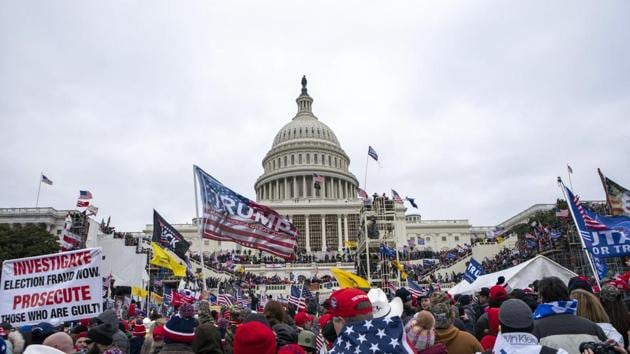After anarchy in the US, reimagining the middle ground
Governments have to learn how to engage with those who did not vote for them. Citizens have to learn how to converse amidst ideological divisions
Indians are not the only ones claiming gloating rights over the anarchist violence in America. From Turkey to Zimbabwe, this is the world’s schadenfreude moment — a sort of payback for the countless times America has lectured the world on democracy.

As Dr Faheem Younus, a Covid-19 expert, known for his people-friendly interventions, wryly tweeted, “This is why I had left Pakistan.”
What other, newer democracies find relatively easy — conducting an election, the counting of votes, the peaceful transition of power — seems to have befuddled the United States (US).
That said, once we are done making the barbs, the jokes and the asides — as well as the earned right to call out systemic hypocrisy and humbug — it might be instructive to look at the takeaways for the rest of us.
For starters, America may have flunked the easier questions in the democracy exam paper, but its institutions — judiciary, media, Congress — continued to push back and remain independent, when most needed. The US has been like the kid at school who couldn’t do basic math but was eccentrically brilliant at quantum physics or game theory.
You can argue, and correctly so, that the spate of Republicans who have so suddenly developed a distaste for Donald Trump enabled him and the mob violence at Capitol Hill to begin with. Absolutely. But they remained alive to the larger notion of an American nationhood and the values that spring from that idea. Equally, I cannot think of a single other country in the world, where Twitter and Facebook, however belatedly, would have been able to lock out the most powerful man in the country, even if he was on his way out.
But as Joe Biden gets ready to take office, ironically more empowered by this moment than otherwise, the real challenge before him is how he intends to be a president, also for the 71 million-plus citizens who voted for a hate-monger.
The rise of Right-wing populism globally has divided not just countries, but families. It has broken relationships and torn apart friendships. It has created social media discord and abuse, and led to unprecedented name-calling. Trump is gone, but as KC Singh, a veteran diplomat, told me, “Trumpism is alive.”
This polarisation, and inability to converse across the ideological divide, is not specific to America. This Right vs Left fault line has been drawn through all of our nations. In India too, your political choice has come to define all of you. And if you fail the ideological purity test of one or the other side, you are immediately branded a traitor. In India, for instance, anyone who is not Arundhati Roy or Arnab Goswami — speaking metaphorically in both cases — is seen to be a sell-out by critics.
The appalling, ugly insurrection at Capitol Hill leaves the world with some of these questions to grapple. There can be and must not be any normalisation of gross prejudice or violence. To even call the rioters “protesters”, as so much of the media was doing initially, is plain wrong. Much like, here in India, we use phrases such as cow vigilantes for those who have killed in the name of meat, and “love jihad” as if it is a normal, entirely acceptable phrase, and not a political construct.
That said, one has to face the fact that not everyone who voted for Trump could be placed in the “basket of deplorables” as Hillary Clinton once did. Rahul Gandhi, recently, made the same fatal error when he conflated his attack on the Modi government with those who voted it to power.
There have to be red lines drawn, and non-negotiables established. And these must conform to the Constitution. But the challenge for any government that wins elections in an age of polarisation is how much it engages with those who did not vote for it. And the challenge for all of us, no matter which part of the world we are in, is how we handle our ideological differences.
So many American friends I know, especially younger Americans, thought there was no fundamental difference between Biden, seen to be an establishmentarian, and Trump. They were seen to be variations on a spectrum. The Capitol Hill eruption seals the debate on that. In the aftermath of the Trump exit, Biden, reviled so often as a centrist, or before him, Obama, never seen to be Left enough for the Left, are today living illustrations of the fact that progressives often make enemies of each other, instead of the hardline hate-mongers.
In a world so bitterly divided, that much-maligned word — middle ground — will have to be reimagined. Therein lies our collective future.




